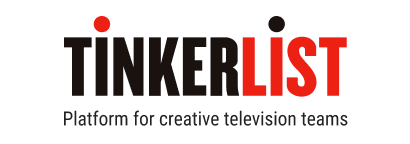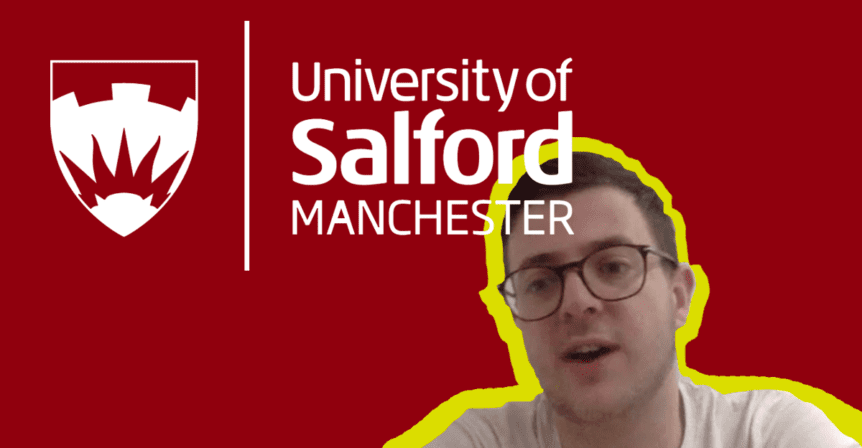We’re already on our third interview with universities so far! This time we’re talking to Matthew Robinson, a student ‘TV & Radio’ at the University of Salford.
What’s your name and what do you study at the University of Salford?
My name is Matthew Robinson and I study ‘TV & Radio’ at the University of Salford.
What does your week usually look like?
I’m now in my final semester. So at the moment the only sort of module we have is our final major project. Which sort of in my case is a TV studio program which is between 20 and 30 minutes. And you basically have to arrange, produce the whole thing. It’s a big team project, but sort of led by one person.
What do you love most about your studies?
For me it’s the fact that it is live and that it is like instant. I’m not very- I’m not a particularly patient person. It’s very like, you know, very time consuming. I just like it when you prepare as much as you can, and then you go for it. You do the recording or you do the live show.
The adrenaline?
Yeah it’s that: “You can’t mess it up”. You have to do it right. And that sort of pressure. I sort of like that. I thrive in that sort of pressure environment.
What do you think is the future of live television?
Yeah! There is always going to be a place for live television because it’s live it’s relevant. It’s happening now. People feel sort of a connection with the people when they watch live television because everybody’s watching the same thing. Or in the case of news, for example, they kind of- There’s obviously the benefit and the need because it’s current, it’s happening, you know? The first thing a lot of us do when there’s a big world event is obviously switch on the news. Obviously, you might see tweets and things and then you sort of go to the news and you want that sort of reliable stream of information. Even in today’s digital sphere, there’s still going to be that ‘want’.
And I think, you know, we can enhance the ‘want’ through digital technologies, like people kind of discussing things as it’s happening and being very sort of interactive and kind of aware that that’s a thing, I suppose.
What’s the most challenging thing about your studies?
Well, I suppose the most challenging thing about that, is that it is LIVE. It is that ‘one take’ you know? You have to… You have to perform at your best. And if you don’t, then obviously, things will sort of suffer. The program will suffer. Yeah, it is tricky, I suppose, working in a team, making sure that if something does go wrong, you handle it in the best way. I think especially as a student crew with myself, obviously not having that much experience… Or the people in the studio not having that much experience. It’s kind of trying to, I suppose, stay focused and really just not trying to get too stressed.
How would you compare both workflows before and after integrating TinkerList?
The workflow in TinkerList is great because it’s cloud-based. You know? It’s just so much easier if you have kind of one thing that everybody’s sort of working from and working with. As opposed to, you know, maybe I send a document to someone and then they send it back with changes and then you know you’ve got scripts: “final version one” and then you know… Things like that. And also, I suppose it saves on printing which as a university, you would think printing would be easy but printing is really expensive, especially for for students. The university likes to charge you for printing for some reason. But, yeah, you can imagine printing however many scripts.
It’s just, like, really, really annoying and kind of long-winded whereas- Especially with things that are changing constantly, it’s great that we can all kind of view it sort of digitally and everybody can still have it with them and can kind of work from it wherever they are. Four of us could be on the document. We’re all editing at the same time and you know, or we can leave comments that somebody else can pick up and assign things to people, you know, that sort of like workflows like really useful and really easy to use. I obviously quite like the ‘TV Studio’ stuff, so I thought it was really interesting. Because for the two year previous we just used sort of like ‘Word documents’ or something. So it was quite good to see a different side and something that’s obviously expanding and… and is sort of like a new technology.
How was the process of getting acquainted with the platform?
There was a little bit of confusion at the start with kind of exactly how the things- Because obviously it’s different when you go from, you know, you just having a blank document to having something that you sort of, I suppose, build in yourself you know? You’re adding modules here and fill in bits out and then it sort of works out for you. So yeah, I think there is a little bit of confusion from some people at the start just basically figuring out “Oh this is slightly different”, “How does this work?”…
And then through, I suppose, a combination of playing with it and kind of asking questions with the sort of module leaders, I think people are fairly comfortable with it now.

